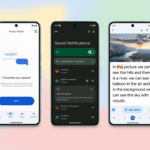Final week on the inaugural Africa Climate Summit (ACS) in Nairobi, Kenya, we joined African leaders and shared our dedication to advance AI options to deal with the local weather disaster. This ACS highlighted Africa’s contributions as an essential participant within the collective effort to drive local weather adaptation and mitigation actions globally.
The continent is disproportionately impacted by the results of local weather change, from devastating floods to meals insecurity, and infrequently lacks the infrastructure and sources to handle these dangers. The African Union Commissioner for Agriculture, Rural Improvement, Blue Economic system, and Sustainable Improvement, Josefa Sacko, shared that with out pressing motion, the continent might face many years of “climate-induced strain on the continent’s economies, livelihoods and nature.” It’s our robust perception that AI may also help.
My colleagues and I mentioned our AI options, how AI may also help African communities and companies and the potential for additional innovation with coverage makers, entrepreneurs and educational researchers from throughout the continent. The summit highlighted the significance of collaboration in tackling local weather change.
Listed here are three ways in which we’re working with governments, organizations and communities to assist tackle local weather challenges:
1. A partnership-based method
We’re working collaboratively with nationwide governments, the UN World Meteorological Group and NGOs to boost consciousness of our AI tools that may assist help communities affected by pure hazards, comparable to floods and wildfires, by offering early warnings. Our Flood Hub platform, for instance, shows forecasts for riverine floods in 80 nations, 23 of that are in Africa. That is doable as a consequence of our world AI model that may even predict the conduct of rivers we’ve by no means seen earlier than, which is important in lots of elements of Africa the place historic knowledge is scarce. We are going to proceed to advance the applied sciences and AI instruments, increase consciousness of such instruments and discover use circumstances via collaborations.
2. Groups in Africa working for and with communities
Our Google Analysis workforce in Africa has researchers each in Accra, Ghana, and Nairobi, Kenya. These groups are on the forefront of driving improvements to deal with societal challenges in Africa. For instance, our workforce is exploring numerous ways in which AI would possibly be capable of assist tackle the rising problem of meals safety, from forecasting meals insecurity, to growing meals manufacturing and managing pests. This work is important as 70% of Africans depend on agriculture and farming for a part of their earnings. Altering patterns in local weather, excessive climate and the financial system are having an unprecedented impression on susceptible populations, whereas manufacturing in Africa should improve to fulfill the speedy projected inhabitants development.









